Saturday, December 06, 2008
Saint Nicholas
Today is the feast of probably the most popular saint in Christendom, the patron of children, young people, poor people, prisoners, thieves, murderers, pawnbrokers, and those seeking marriage, Saint Nicholas of Myra.
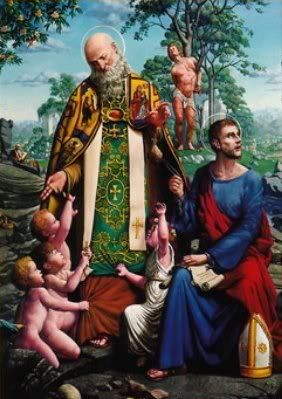
This is what The Golden Legend has to say about him.
The Saint Nicholas Center is your go-to resource on Good Saint Nicholas.
Wilson's Almanac also has a great deal of good material.
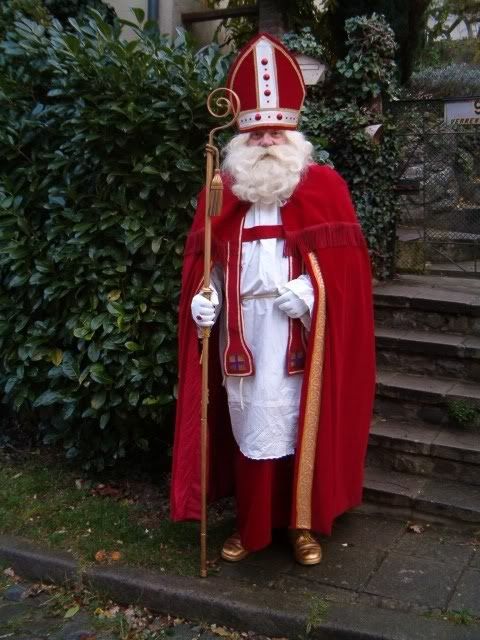
On the surface, the modern Dutch Sinterclaas looks more like the original bishop of Myra. That despite the fact that the Dutch are perhaps the most post-Christian culture in Europe.
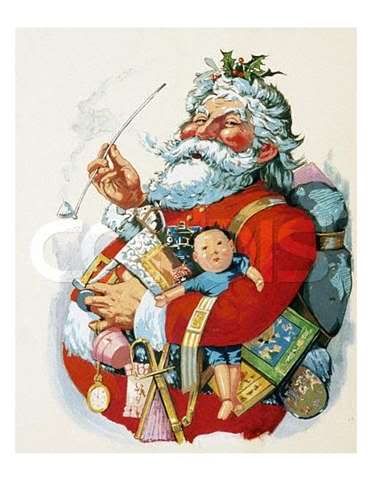
Thomas Nast's 19th century American rendition.

Twentieth Century American artist Haddon Sundblom, working for the Coca Cola Company, helped establish the modern image of Saint Nicholas, or Santa Claus.
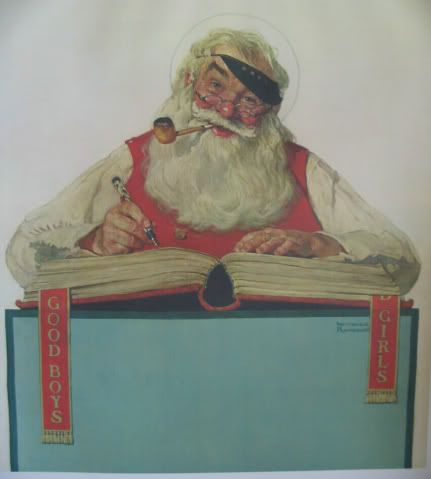
As did Norman Rockwell, working mostly for the Saturday Evening Post.
Efforts are made from time to time to update Saint Nicholas' garb and image, but they are rejected by children themselves. Ironically, the young are the ones who insist that Santa looks like this, and nothing else. You can put black boots on him, rather than brown (but they have to be the same style). You can put a strip of white fur down the front of his coat. Sometimes he can wear a harness with sleigh bells. And you can give him green mittens. But changes beyond that are rejected by children out of hand as unbecoming to Jolly Old Saint Nicholas.
Maybe Nast's/Sundblom's/Rockwell's vision has so much staying power because it is anchored in tradition. The red and white coat is an adaptation of a bishop's robes. The miter has become a fur hat.
Happy Saint Nicholas' Day!
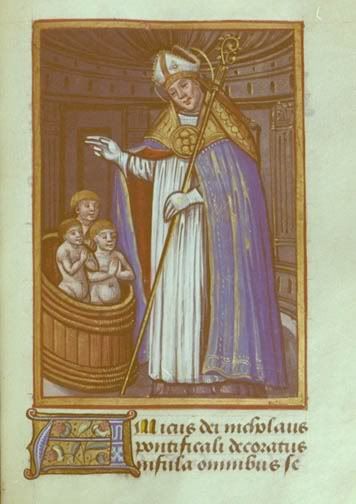
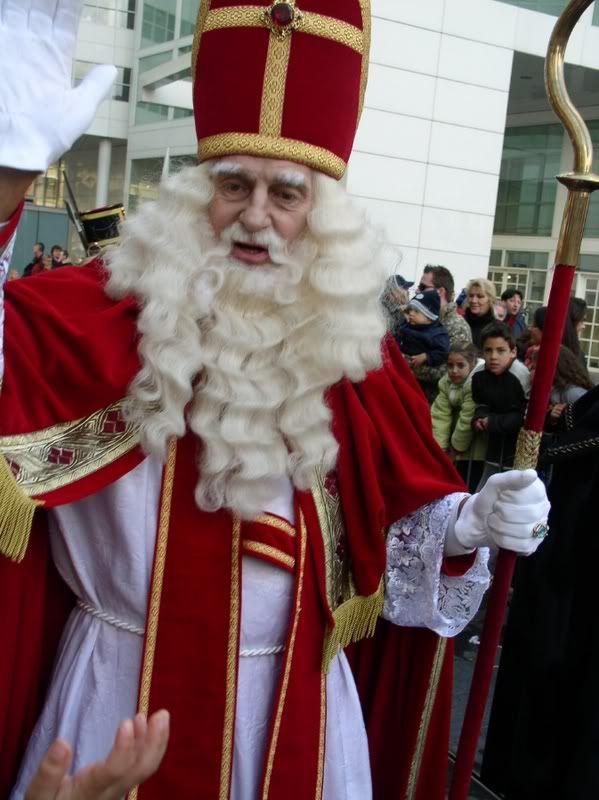
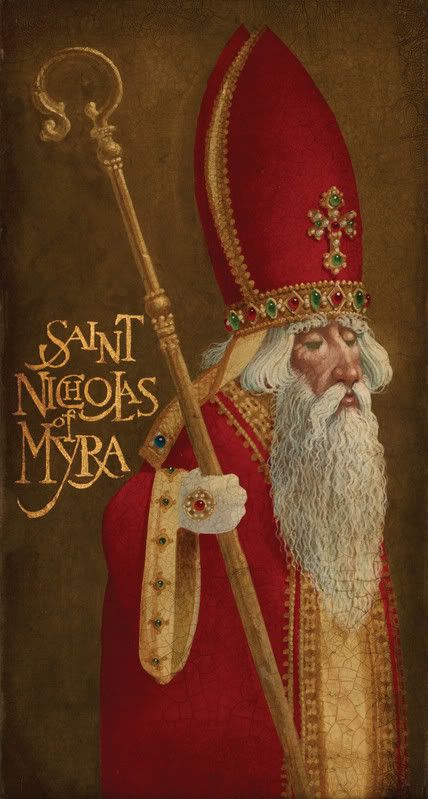
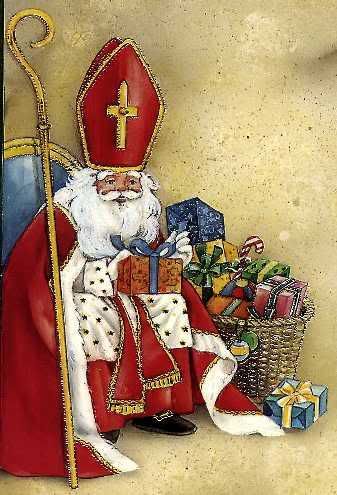
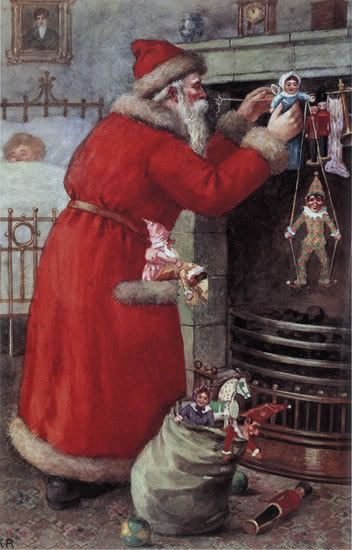

Saint Nicholas, pray for us!

This is what The Golden Legend has to say about him.
The Saint Nicholas Center is your go-to resource on Good Saint Nicholas.
Wilson's Almanac also has a great deal of good material.

On the surface, the modern Dutch Sinterclaas looks more like the original bishop of Myra. That despite the fact that the Dutch are perhaps the most post-Christian culture in Europe.

Thomas Nast's 19th century American rendition.

Twentieth Century American artist Haddon Sundblom, working for the Coca Cola Company, helped establish the modern image of Saint Nicholas, or Santa Claus.

As did Norman Rockwell, working mostly for the Saturday Evening Post.
Efforts are made from time to time to update Saint Nicholas' garb and image, but they are rejected by children themselves. Ironically, the young are the ones who insist that Santa looks like this, and nothing else. You can put black boots on him, rather than brown (but they have to be the same style). You can put a strip of white fur down the front of his coat. Sometimes he can wear a harness with sleigh bells. And you can give him green mittens. But changes beyond that are rejected by children out of hand as unbecoming to Jolly Old Saint Nicholas.
Maybe Nast's/Sundblom's/Rockwell's vision has so much staying power because it is anchored in tradition. The red and white coat is an adaptation of a bishop's robes. The miter has become a fur hat.
Happy Saint Nicholas' Day!






Saint Nicholas, pray for us!
Labels: Our Saintly Brethern
Our Blessed Lady's Saturday
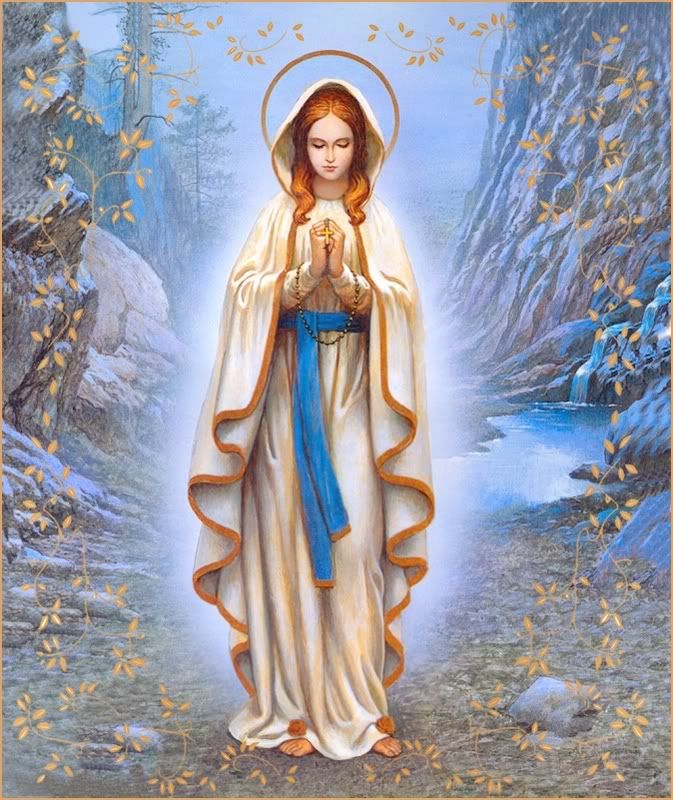
Matins Of the Little Office of the Immaculate Conception
Come, my lips, and wide proclaim
The Blessed Virgin's spotless fame.
V. O LADY! make speed to befriend me.
R. From the hands of the enemy mightily defend me.
V. Glory be to the Father, etc. Alleluia.
Hymn
HAIL, Queen of the Heavens!
Hail, Mistress of earth!
Hail, Virgin most pure
Of immaculate birth!
Clear Star or the morning
In beauty enshrined!
O Lady! make speed
To the help or mankind.
Thee God in the depth
Of eternity chose;
And formed thee all fair,
As His glorious spouse;
And called thee His Word's
Own Mother to be,
By Whom He created
The earth, sky, and sea.
Amen.
V. God elected her, and pre-elected her.
R. He made her to dwell in His tabernacle.
V. O Lady! aid my prayer.
R. And let my cry come unto thee.
Let us pray
HOLY Mary, Queen of Heaven, Mother of Our Lord Jesus Christ,
and Mistress of the world, who forsakest no one, and despisest no one,
look upon me, O Lady! with an eye of pity, and entreat for me, of thy beloved Son,
the forgiveness of all my sins, that, as I now celebrate, with devout affection,
thy holy and Immaculate Conception, so, hereafter, I may receive
the prize of eternal blessedness, by the grace of Him Whom thou, in virginity,
didst bring forth, Jesus Christ our Lord: Who, with the Father and the Holy Ghost,
liveth and reigneth, in perfect Trinity, God, world without end. Amen.
V. O Lady! aid my prayer.
R. And let my cry come unto thee.
V. Let us bless the Lord.
R. Thanks be to God.
V. May the souls of the faithful departed,
through the mercy of God,
rest in peace.
R. Amen.
Labels: Our Blessed Lady
Friday, December 05, 2008
Friday At the Foot Of the Cross
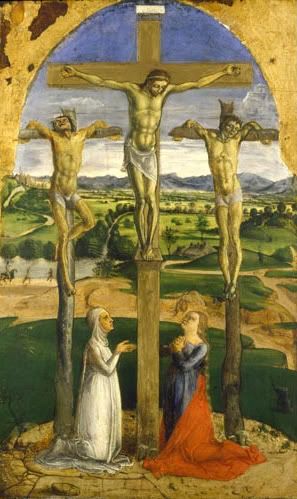
Prayer Before the Crucifix from The Raccolta
My Divine Savior, what didst Thou become, when for love of souls Thou didst suffer Thyself to be bound to the pillar? Ah! how truly then was fulfilled the word of the Prophet, saying of Thee that from head to foot Thou shouldst be all one wound, so as to be no longer recognizable! What shame Thou didst endure when they stripped Thee of Thy garments! What torments Thou didst undergo in that tempest of countless blows! In what torrents did Thy Most Precious Blood gush forth from Thy bursting veins!
I know well it was not so much the injustice of the Roman governor and the cruelty of the soldiers that scourged Thee as my sins. O accursed sins, that have cost Thee so many pains! Alas, what hardness of heart, when notwithstanding Thy manifold sufferings for me I have continued to offend Thee! But from this day forth it shall be so no longer. United to Thee by bonds of loyalty for ever, as long as I shall live, I shall seek to satisfy Thine offended justice. By the pains Thou didst suffer when bound to the pillar, by the scourges which tore Thine innocent Flesh, by the Blood which Thou didst shed in such abundance, have mercy on this unhappy soul of mine; deliver me today and always from the snares of the tempter; and when I have come to the end of my exile, bring me safely home to Heaven with Thee.
Behold me at Thy feet, O Jesus of Nazareth, behold the most wretched of creatures, who comes into Thy presence humbled and penitent! Have mercy on me, O Lord, according to Thy great mercy! I have sinned and my sins are always before Thee. Yet my soul belongs to Thee, for Thou hast created it, and redeemed it with Thy Precious Blood. Ah, grant that Thy redeeming work be not in vain! Have pity on me; give me tears of true repentance; pardon me for I am Thy child; pardon me as Thou didst pardon the penitent thief; look upon me from Thy throne in Heaven and give me Thy blessing.
Say the Apostles Creed.
O Jesus, Who in Thy bitter Passion didst become "the most abject of men, a man of sorrows,"
I venerate Thy sacred Face whereon there once did shine the beauty and sweetness of the Godhead; but now It has become as it were the face of a leper! Nevertheless under those disfigured features, I recognize Thine infinite Love, and I am consumed with desire to love Thee and make Thee loved by all men. The tears which well up so abundantly in Thy sacred eyes appear to me as so many precious pearls that I love to gather up, in order to purchase the souls of poor sinners by means of their infinite value. O Jesus, whose adorable Face ravishes my heart, I implore Thee to fix deep within me Thy Divine image and to set me on fire with Thy love, that so I may be found worthy to come to the contemplation of Thy glorious Face in Heaven.
Amen.
Labels: Friday At the Foot Of the Cross
Thursday, December 04, 2008
Saint Barbara
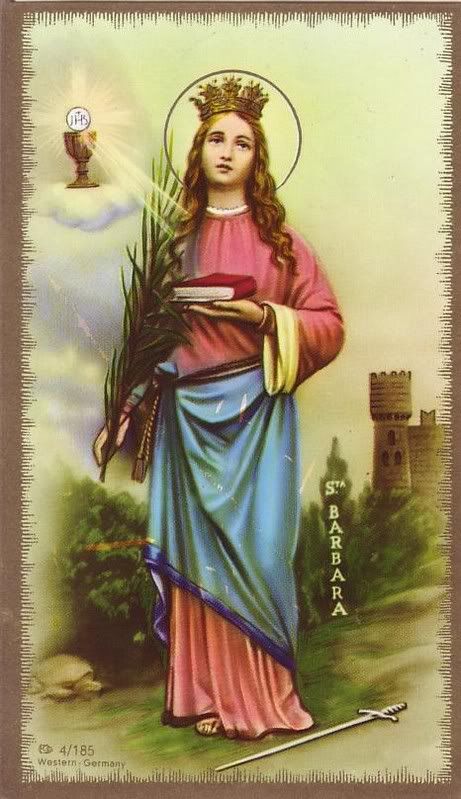
The Golden Legend on this virgin and martyr.
She is the patron of artillerists, and the gunners usually have a special dinner in her honor on this night. The artillerists of 18th century Europe and America retained something of the flavor of an international guild of artisans. The gunners in all Western armies of the period wore essentially the same uniform, blue coats with red collars, cuffs, and lapels, to the extent that the uniform regulations of the national army they belonged to allowed it.
So a happy St. Barbara's night to all my friends in the Royal Artillery and the Royal Irish Artillery!
I find the narration here a little annoying, but this clip shows a small fieldpiece being worked by the Royal Artillery at the annual Under the Redcoat weekend at Williamsburg.
Labels: Our Saintly Brethern
Wednesday, December 03, 2008
New Likes For Christmas Music
This year, I have been doing a good bit of touring about YouTube, and have discovered three groups that I was pretty much unaware of before. It is good, from time to time, to broaden one's tastes a bit. The last broadening came when Rush Limbaugh introduced me, and the rest of his audience, to Mannheim Steamroller in the very early 90s. Their Silent Night, from the first Christmas CD, was moving beyond words, especially given how Rush introduced it (the background story is that he first heard it on the plane going home for his father's funeral, and it put me in mind of my own father's then-still-recent death). That led to Chip Davis' Renaissance Holiday CD.
Cruising around YouTube, I have this year discovered Celtic Woman. I know, I am probably the last person on earth to have heard them. But now that I have heard them, I like them. Lots of good music for Christmas, and for other times of the year, as well.
But I didn't stop with Celtic Woman. I also discovered that I like the Trans-Siberian Orchestra. Their rendition of The Carol of the Bells is great. I had heard about them before, and people used to scratch their heads at me when I told them I only liked Mannheim Steamroller. If one, why not the other, too?
And that's not all. I had never heard of Blackmore's Night before, until I stumbled yesterday onto their rendition of I Saw Three Ships. It is a great blend of Renaissance and modern, with what sounds like an authentic English accent. Their Winter Carols CD looks promising.
Cruising around YouTube, I have this year discovered Celtic Woman. I know, I am probably the last person on earth to have heard them. But now that I have heard them, I like them. Lots of good music for Christmas, and for other times of the year, as well.
But I didn't stop with Celtic Woman. I also discovered that I like the Trans-Siberian Orchestra. Their rendition of The Carol of the Bells is great. I had heard about them before, and people used to scratch their heads at me when I told them I only liked Mannheim Steamroller. If one, why not the other, too?
And that's not all. I had never heard of Blackmore's Night before, until I stumbled yesterday onto their rendition of I Saw Three Ships. It is a great blend of Renaissance and modern, with what sounds like an authentic English accent. Their Winter Carols CD looks promising.
Labels: Advent
From You Tube To Your Screen
O Come, O Come Emmanuel
I like this one better
And what could be better than to hear it chanted, in Latin, during the incensing of the altar at a traditional Mass?
I like this one better
And what could be better than to hear it chanted, in Latin, during the incensing of the altar at a traditional Mass?
Labels: Advent
Monday, December 01, 2008
Saint Edmund Campion
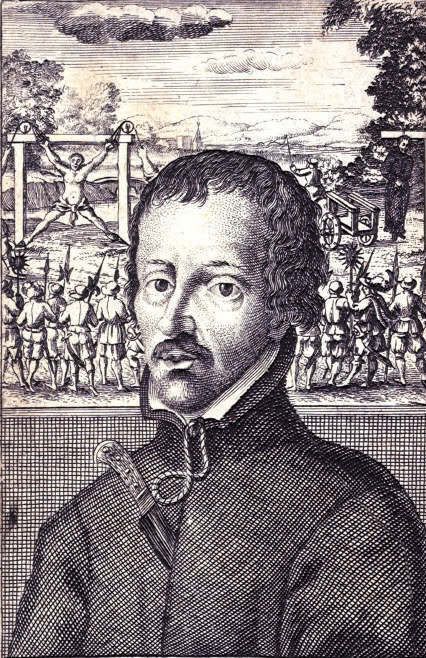
The Catholic Encylopedia on this heroic martyred priest.
Wikipedia
Here is the text of Campion's Brag, his defense of the Faith against the English protestant establishment.
To the Right Honourable, the Lords of Her Majesty's Privy Council:
Whereas I have come out of Germany and Bohemia, being sent by my superiors, and adventured myself into this noble realm, my dear country, for the glory of God and benefit of souls, I thought it like enough that, in this busy, watchful, and suspicious world, I should either sooner or later be intercepted and stopped of my course.
Wherefore, providing for all events, and uncertain what may become of me, when God shall haply deliver my body into durance, I supposed it needful to put this in writing in a readiness, desiring your good lordships to give it your reading, for to know my cause. This doing, I trust I shall ease you of some labour. For that which otherwise you must have sought for by practice of wit, I do now lay into your hands by plain confession. And to the intent that the whole matter may be conceived in order, and so the better both understood and remembered, I make thereof these nine points or articles, directly, truly and resolutely opening my full enterprise and purpose.
i. I confess that I am (albeit unworthy) a priest of the Catholic Church, and through the great mercy of God vowed now these eight years into the religion [religious order] of the Society of Jesus. Hereby I have taken upon me a special kind of warfare under the banner of obedience, and also resigned all my interest or possibility of wealth, honour, pleasure, and other worldly felicity.
ii. At the voice of our General, which is to me a warrant from heaven and oracle of Christ, I took my voyage from Prague to Rome (where our General Father is always resident) and from Rome to England, as I might and would have done joyously into any part of Christendom or Heatheness, had I been thereto assigned.
iii. My charge is, of free cost to preach the Gospel, to minister the Sacraments, to instruct the simple, to reform sinners, to confute errors—in brief, to cry alarm spiritual against foul vice and proud ignorance, wherewith many of my dear countrymen are abused.
iv. I never had mind, and am strictly forbidden by our Father that sent me, to deal in any respect with matter of state or policy of this realm, as things which appertain not to my vocation, and from which I gladly restrain and sequester my thoughts.
v. I do ask, to the glory of God, with all humility, and under your correction, three sorts of indifferent and quiet audiences: the first, before your Honours, wherein I will discourse of religion, so far as it toucheth the common weal and your nobilities: the second, whereof I make more account, before the Doctors and Masters and chosen men of both universities, wherein I undertake to avow the faith of our Catholic Church by proofs innumerable—Scriptures, councils, Fathers, history, natural and moral reasons: the third, before the lawyers, spiritual and temporal, wherein I will justify the said faith by the common wisdom of the laws standing yet in force and practice.
vi. I would be loath to speak anything that might sound of any insolent brag or challenge, especially being now as a dead man to this world and willing to put my head under every man's foot, and to kiss the ground they tread upon. Yet I have such courage in avouching the majesty of Jesus my King, and such affiance in his gracious favour, and such assurance in my quarrel, and my evidence so impregnable, and because I know perfectly that no one Protestant, nor all the Protestants living, nor any sect of our adversaries (howsoever they face men down in pulpits, and overrule us in their kingdom of grammarians and unlearned ears) can maintain their doctrine in disputation. I am to sue most humbly and instantly for combat with all and every of them, and the most principal that may be found: protesting that in this trial the better furnished they come, the better welcome they shall be.
vii. And because it hath pleased God to enrich the Queen my Sovereign Lady with notable gifts of nature, learning, and princely education, I do verily trust that if her Highness would vouchsafe her royal person and good attention to such a conference as, in the second part of my fifth article I have motioned, or to a few sermons, which in her or your hearing I am to utter such manifest and fair light by good method and plain dealing may be cast upon these controversies, that possibly her zeal of truth and love of her people shall incline her noble Grace to disfavour some proceedings hurtful to the realm, and procure towards us oppressed more equity.
viii. Moreover I doubt not but you, her Highness' Council, being of such wisdom and discreet in cases most important, when you shall have heard these questions of religion opened faithfully, which many times by our adversaries are huddled up and confounded, will see upon what substantial grounds our Catholic Faith is builded, how feeble that side is which by sway of the time prevaileth against us, and so at last for your own souls, and for many thousand souls that depend upon your government, will discountenance error when it is bewrayed [revealed], and hearken to those who would spend the best blood in their bodies for your salvation. Many innocent hands are lifted up to heaven for you daily by those English students, whose posterity shall never die, which beyond seas, gathering virtue and sufficient knowledge for the purpose, are determined never to give you over, but either to win you heaven, or to die upon your pikes. And touching our Society, be it known to you that we have made a league—all the Jesuits in the world, whose succession and multitude must overreach all the practice of England—cheerfully to carry the cross you shall lay upon us, and never to despair your recovery, while we have a man left to enjoy your Tyburn, or to be racked with your torments, or consumed with your prisons. The expense is reckoned, the enterprise is begun; it is of God; it cannot be withstood. So the faith was planted: So it must be restored.
ix. If these my offers be refused, and my endeavours can take no place, and I, having run thousands of miles to do you good, shall be rewarded with rigour. I have no more to say but to recommend your case and mine to Almighty God, the Searcher of Hearts, who send us his grace, and see us at accord before the day of payment, to the end we may at last be friends in heaven, when all injuries shall be forgotten.
Labels: Our Saintly Brethern
December

I am repeating last year's banner image because I like it so much
Important feasts celebrated during December include:
1st St. Edmund Campion
3rd St. Francis Xavier
4th St. Barbara
6th St. Nicholas
7th St. Ambrose
8th The Immaculate Conception
9th Ven Fulton Sheen
12th Our Lady of Guadalupe
13th St. Lucy
16th St. Adelaide
21st St. Thomas the Apostle and St. Peter Canisius
22nd St. Frances Xavier Cabrini
23rd St. John Cantius
24th Christmas Eve and Adam & Eve
25th Christmas
26th St. Stephen
27th St. John the Apostle
28th Holy Innocents
29th St. Thomas a Becket
December is dedicated to the Immaculate Conception of our Blessed Lady.
The Immaculate Conception on Monday December 8th and Christmas on December 25th are Holy Days of Obligation. January 1st is also a Holy Day of Obligation.
Our Holy Father Pope Benedict XVI's prayer intentions for December, 2008 are:
General:
That in the face of a spreading of a culture of violence and death the Church through her apostolic and missionary activity may promote with courage the culture of life.
Mission:
That especially in mission countries Christians may show with acts of fraternal love that the Child born in the stable at Bethlehem is the luminous Hope of the world..
The First Friday of the month is December 5th.
The First Saturday of the month is December 6th.
Important novenas commonly said during the month include the Advent Novena I (Nov. 30th-Dec. 24th), Advent Novena II (Dec. 16th-Dec. 24th), and the Epiphany Novena (Dec 28-January 5th).
The O Antiphons of Advent are integrated into evening prayer beginning December 17th.
The Season of Advent begins on Sunday November 30th, and continues until the 24th, when it is succeeded by the Season of Christmas.
The Advent Embertide is the week of Gaudete Sunday. Ember Wednesday is December 17th, Ember Friday is December 19th, and Ember Saturday is December 20th.
December 31st is New Year's Eve in the secular calendar.
Labels: First Of the Month Almanac
Sunday, November 30, 2008
First Sunday Of Advent
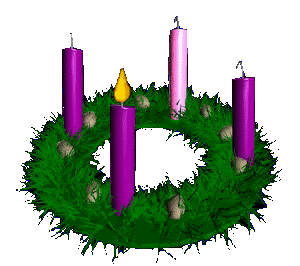
From The Liturgical Year, by Abbot Prosper Gueranger, OSB:
Station Church: Saint Mary Major
THIS Sunday, the first of the ecclesiastical year, is called, in the chronicles and charts of the middle ages, Ad te levavi Sunday, from the first words of the Introit; or, Aspiciens a longe, from the first words of one of the responsories of Matins.
The Station {The Stations marked in the Roman missal for certain days in the year, were formerly processions, in which the whole clergy and people went to some given church, and there celebrated the Office and Mass. This usage, which dates from the earliest period of the Roman Church, and of which St. Gregory the Great was but the restorer, still exists, at least in a measure; for the Stations are still observed, though with less solemnity and concourse of people, or, all the days specified in the missal.} is at St. Mary Major's. It is under the auspices of Mary---in the splendid basilica which possesses the crib of Bethlehem, and is therefore called, in ancient documents, St. Mary's ad Præsepe that the Roman Church, recommences, each year, the sacred cycle. It would have been impossible to select a place more suitable than this for saluting the approach of the divine birth, which is to gladden heaven and earth, and manifest the sublime portent of a Virgin Mother. Let us go in spirit to this august temple, and unite in the prayers which are there being offered up: they are the very ones we also use, and which we will now explain.
In the night Office, the Church commences the reading of the Book of Isaias, who, of all the Prophets, has the most distinctly and explicitly foretold the Messias; and she continues this same Book until Christmas day inclusively. Let us strive to enter into the teaching of the holy prophet, and let the eye of our faith affectionately recognize the promised Saviour in the descriptions, sometimes consoling and sometimes terrifying, under which Isaias depicts Him.
The Saviour, then, who is coming to us is the clothing which we are to put on over our spiritual nakedness. Here let us admire the goodness of our God, who, remembering that man hid himself after his sin, because he was naked, vouchsafes Himself to become man's clothing, and to cover with the robe of His Divinity the misery of human nature. Let us, therefore, be on the watch for the day and the hour when He will come to us, and take precautions against the drowsiness which comes of custom and self-indulgence. The light will soon appear; may its first rays be witness of our innocence, or at least of our repentance. If our Saviour is coming to put over our sins a covering which is to hide them for ever, the least that we, on our part, can do, is to retain no further affection for those sins, else it will be said of us that we refused our salvation. The last words of this Epistle are those which caught the eye of St. Augustine, when, after a long resistance to the grace which pressed him to give himself to God, he resolved to obey the voice which said to him: `Tolle lege; take and read.' They decided his conversion; he immediately resolved to abandon the worldly life he had hitherto led, and to put on Christ Jesus. Let us begin this very day, and imitate this saint. Let us long for that dear and glorious clothing with which the mercy of our heavenly Father is so soon to cover us; and let us say with the Church these touching words, which we cannot repeat too often during this time of the year ...
Thou art to come, then, O Jesus, in all the terror of the last judgement, and when men least expect Thee. In a few days Thou art coming to us to clothe our misery with the garment of Thy mercy; a garment of glory and immortality to us; but Thou art to come again on a future day, and in such dread majesty that men will wither away with fear. O my Saviour! condemn me not on that day of the world's destruction. Visit me now in Thy love and mercy; I am resolved to prepare my soul. I desire that Thou shouldst come and be born within me, so that when the convulsions of nature warn me of Thy coming to judge me, I may lift up my head, as Thou biddest Thy faithful disciples do, who, when the rest of men shall tremble at the thunder of Thy judgement, will have confidence in Thee, because they have Thee in their hearts.
Labels: Advent
Saint Andrew's Night
The feast of Saint Andrew is one of the four saints' days commemorated in the messes of the British Army. Andrew is the patron of Scotland. Saint George (April 23rd) is the patron of England. Saint David (March 1st) is the patron of Wales. Saint Patrick, of course, is the patron of Ireland. Saint Andrew's Day is the only one of the four not in late-winter/early-spring.
Artillerists, who have always been a breed apart, no matter what the nationality (and in the 18th century, American, British, French, and German gunners all wore blue coats faced red, as a symbol of their guild-like international commonality) celebrate their own patron, St. Barbara, on December 4th.
Because of my re-enacting experience, I am either a member of, or have been a guest of, the messes of regiments of all four major ethnic groups of the British Isles. I have dined with the Royal Welch Fusiliers (23rd Regiment of Foot) officers' mess on March 1st, with the Friendly Brothers of Saint Patrick on March 17th, with the officers' mess of the Black Watch (Royal Highland Regiment, or 42nd Regiment of Foot) on November 30th, and with the Loyal and Friendly Society of the Blue and Orange on April 23rd (St. George's Day).
These evenings are convivial occasions, with a formal dinner, many, many toasts, and seemingly eccentric regimental customs. You would not want to drive yourself home after one of these dinners. Re-enactor officers are just being true to the characters they portray in these celebrations. But 18th century officers could not be pulled over for DUI.
John Peebles, an officer of the grenadier company of the 42nd Regiment celebrated St. Andrew's Night thus in his New York-area garrison in 1779:
Went to town to celebrate the day with his Ex (he mounted a round blue device with a white Saint Andrew's cross in his regulation highland bonnet-GTF): where the field offs. & Capts. of the 42nd. were invited, the Adml. there the offrs. of the Royal Highland emigrants & some others, about 24 in all. Major Small personated the Saint who gave very good toasts & apropos for the occasion. The Adml. very chatty & entertaining. Major Hay sang some good songs & spouted a prologue very well. A good dinner & drink till 10 o'clock. A numerous party of the Sons of St. Andw. din'd at Hick's above 60, among whom were the subs. (subalterns: lieutenants and ensigns- GTF) of the 42d. Exchanged a complit. & some of our Compy. join'd them after we broke up, & made a night of it.
John Peebles'American War 1776-1782, edited by Ira Gruber, 1997.
I wish my Scottish friends of the 42nd, 71st, 74th, and 84th Regiments of Foot a happy Saint Andrew's Day, with much enjoyment of haggis and that amber-coloured beverage distilled in the Highlands.
Artillerists, who have always been a breed apart, no matter what the nationality (and in the 18th century, American, British, French, and German gunners all wore blue coats faced red, as a symbol of their guild-like international commonality) celebrate their own patron, St. Barbara, on December 4th.
Because of my re-enacting experience, I am either a member of, or have been a guest of, the messes of regiments of all four major ethnic groups of the British Isles. I have dined with the Royal Welch Fusiliers (23rd Regiment of Foot) officers' mess on March 1st, with the Friendly Brothers of Saint Patrick on March 17th, with the officers' mess of the Black Watch (Royal Highland Regiment, or 42nd Regiment of Foot) on November 30th, and with the Loyal and Friendly Society of the Blue and Orange on April 23rd (St. George's Day).
These evenings are convivial occasions, with a formal dinner, many, many toasts, and seemingly eccentric regimental customs. You would not want to drive yourself home after one of these dinners. Re-enactor officers are just being true to the characters they portray in these celebrations. But 18th century officers could not be pulled over for DUI.
John Peebles, an officer of the grenadier company of the 42nd Regiment celebrated St. Andrew's Night thus in his New York-area garrison in 1779:
Went to town to celebrate the day with his Ex (he mounted a round blue device with a white Saint Andrew's cross in his regulation highland bonnet-GTF): where the field offs. & Capts. of the 42nd. were invited, the Adml. there the offrs. of the Royal Highland emigrants & some others, about 24 in all. Major Small personated the Saint who gave very good toasts & apropos for the occasion. The Adml. very chatty & entertaining. Major Hay sang some good songs & spouted a prologue very well. A good dinner & drink till 10 o'clock. A numerous party of the Sons of St. Andw. din'd at Hick's above 60, among whom were the subs. (subalterns: lieutenants and ensigns- GTF) of the 42d. Exchanged a complit. & some of our Compy. join'd them after we broke up, & made a night of it.
John Peebles'American War 1776-1782, edited by Ira Gruber, 1997.
I wish my Scottish friends of the 42nd, 71st, 74th, and 84th Regiments of Foot a happy Saint Andrew's Day, with much enjoyment of haggis and that amber-coloured beverage distilled in the Highlands.
Labels: Annual Cycles
If Today Were Not A Sunday
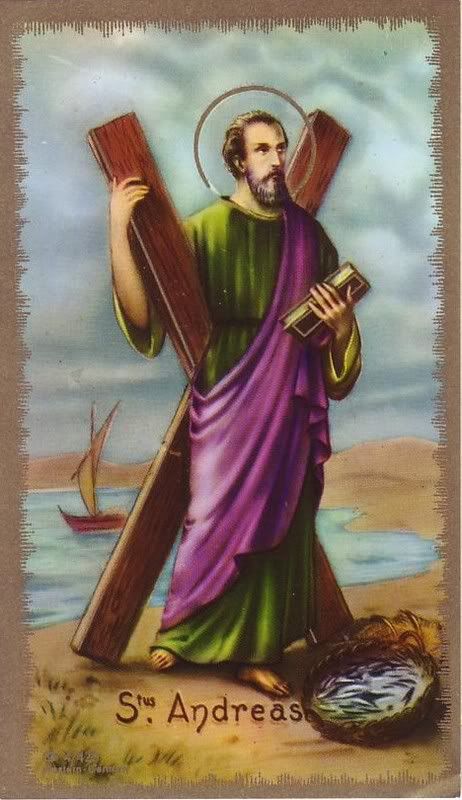
From The Golden Legend
Today, the Church would celebrate Saint Andrew, brother of Simon Peter, disciple of John the Baptist, and Apostle of the Lord.
Andrew was a fisherman from Capharnaum. He was with John the Baptist at the time of the baptism of the Lord, and followed Him from that time, later bringing Peter into the fold of the apostolic college. It was Andrew who reported the state of the food supply to the Lord before the feeding of the five thousand. But otherwise, he appears to have faded into the apostolic group.
Andrew exercised his ministry in the region of the Black Sea, and was crucified on an "X" form crucifix at Patras in Achaia. He is the patron of fishermen and fishmongers, as well as patron of Scotland.
The St. Andrew's Novena (also called the Christmas Anticipation Novena) begins today, and runs through Christmas Eve.
“Hail and blessed
be the hour and the moment
when the Son of God was born
of the most pure Virgin Mary,
at midnight,
in a stable,
in Bethlehem,
in the piercing cold.
In that hour vouchsafe,
O my God,
to hear my prayer
and grant my desires,
through the merits
of Our Savior Jesus Christ,
and of His Blessed Mother.
Amen."
Labels: If Today Were Not A Sunday






































































































